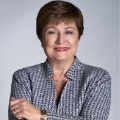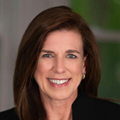Thursday, Oct 14, 2021 | 02:00 PM - 03:00 PM
Location: Meeting Halls A&B, HQ1-3-430A&B

The global recovery continues amid uncertainty on when the pandemic will be overcome. With unequal vaccine access, inflation pressures, and still elevated unemployment, policies face multiple challenges. Join this debate on the global economic outlook.
Join the conversation via #GlobalEcon
 |
Kristalina Georgieva Managing Director, IMF |
Kristalina Georgieva is the Managing Director of the International Monetary Fund (IMF). She is the first person from an emerging market economy to lead the IMF since its inception in 1944. Before joining the Fund, Ms. Georgieva was Chief Executive Officer of the World Bank and also served as Interim President for a time. Previously, she served at the European Commission as Vice President for Budget and Human Resources – and as Commissioner for International Cooperation, Humanitarian Aid and Crisis Response. She was named “European of the Year” and “Commissioner of the Year” by European Voice for her leadership in the European Union’s humanitarian response to crises.
 |
Kristin J. Forbes Professor, Global Economics and Management, MIT |
Kristin Forbes is the Jerome and Dorothy Lemelson Professor of Management and Global Economics at MIT’s Sloan School of Management. She has regularly rotated between academia and senior policy positions. From 2014-2017 she was an External Member of the Monetary Policy Committee for the Bank of England. From 2003 to 2005 Forbes served as a Member of the White House’s Council of Economic Advisers and from 2001-2002 she was a Deputy Assistant Secretary in the U.S. Treasury Department. She also was a Member of the Governor’s Council of Economic Advisers for the State of Massachusetts from 2009-2014.
In 2019, Forbes was named an Honorary Commander of the Order of the British Empire (CBE) by Her Majesty Queen Elizabeth II. She is currently the Convener of the Bellagio Group, a research associate at the NBER and CEPR, and a member of the Aspen Economic Strategy Group and Council on Foreign Relations. She also serves in a number of advisory positions, such as on the Monetary Policy Advisory Panel of the New York Federal Reserve Bank, the Advisory Panel for the Bank for International Settlements, and on the External Advisory Group of the Managing Director for the International Monetary Fund. Forbes’ academic research addresses policy-related questions in international macroeconomics, including on monetary policy, macroprudential tools, capital flows, exchange rates, inflation, and contagion. She has won numerous teaching awards and teaches one of the most popular classes at MIT's Sloan School. Before joining MIT, Forbes worked at the World Bank and Morgan Stanley. She received her PhD in Economics from MIT and graduated summa cum laude with highest honors from Williams College.
 |
Min Zhu Chairman, National Institute of Financial Research at Tsinghua university |
Dr Min Zhu is currently the Chairman of the National Institute of Financial Research at Tsinghua university, Vice Chairman of China Center for International Economic Exchanges, Sino-UK Professional and Financial Service Envoy for the Belt and Road Initiative and a member of G20 High Level Independent Panel on Financing the Global Commons for Pandemic Preparedness and Response. He is a member of the "14th Five-Year Plan" Expert Committee, a member of the Foreign Policy Advisory Committee of the Ministry of Foreign Affairs, a member of United Nations High-level Advisory Board, and a member of the Expert Advisory Committee of the State Internet Information Office, a commissioner of Lancet Global COVID-19 Commission and a Co-Chair of Lancet Task Force on the Green Recovery. He is also a Board Trustee of Fudan University, World Economic Forum, and Peterson Institute for International Economics. Dr Zhu was a Deputy Managing Director at IMF from July 2011 to July 2016. Before that, Dr. Zhu was a Deputy Governor of the People’s Bank of China, and prior to his service at China’s Central Bank, he served as a Group Executive Vice President of the Bank of China. Dr Zhu also worked at the World Bank and taught economics at both Johns Hopkins University and Fudan University.
Dr Zhu received his PhD and M.A. in economics from Johns Hopkins University, an M.P.A. from the Woodrow Wilson School of Public International Affairs at Princeton University, and a B.A. in economics from Fudan University.
 |
Mo Ibrahim Founder, Mo Ibrahim Foundation |
Dr Mo Ibrahim is the Founder and Chair of the Mo Ibrahim Foundation, which he established in 2006 to support good governance and exceptional leadership on the African continent. Sudanese-born, Dr Ibrahim has a distinguished business career. In 1989 he founded Mobile Systems International (MSI), a world leading cellular consulting and software provider, and in 1998, Celtel International, one of Africa’s leading mobile telephone companies which pioneered mobile services in Africa.
Dr Ibrahim has received numerous honorary degrees and fellowships from a range of academic institutions including University of Birmingham, Bradford University, De Montfort University - Leicester, Imperial College - London, London Business School, Royal Academy of Engineering, SOAS - University of London, University of Pennsylvania and Lancaster University.
Dr Ibrahim is the Co-founder and Co-chair of the Africa Europe Foundation, which was launched in 2020 to reset and bolster Africa-Europe relations.
 |
Sara Eisen CNBC Co-Anchor “Closing Bell” |
Sara Eisen is co-anchor of CNBC’s “Closing Bell”. She is known for her deep expertise in financial markets and the global economy as well as regular news making interviews with some of the most prominent names in the financial world. Prior to CNBC, Eisen was co-anchor of “Bloomberg Surveillance” and a correspondent for Bloomberg Television, where she covered global macroeconomics, policy and business. She is the editor of “Currencies After the Crash: The Uncertain Future of the Global Paper-Based Currency System” published by McGraw-Hill.Eisen holds a master’s degree in broadcast journalism with a concentration in business reporting from the Medill School of Journalism at Northwestern University.
Against a complex scenario of uneven economic recovery and difficult policy tradeoffs, international cooperation is more important than ever to tackle shorter- and longer-term challenges, including ending the pandemic everywhere and promoting transformative reforms for a greener, digital future.
Key Points:
Quotes:
“We are now seeing three problems looming bigger than in the previous forecasts: divergence, inflation and debt levels.” Kristalina Georgieva
“In the US, if inflationary pressures are persistent for longer than people are expecting, we know what to do and it involves raising rates.” Kristin J. Forbes
“When we talk about inflation, the key world is transitory. I see the drivers for inflation escalation as non-transitory.” Min Zhu
“The problem should be framed not just as lack of solidarity, which is clear, but misunderstanding even of self-interest – all politicians know that their people cannot be safe until everybody is safe.” Mo Ibrahim
Contributor: Daniela Alcantara, IMF, Secretary’s Department